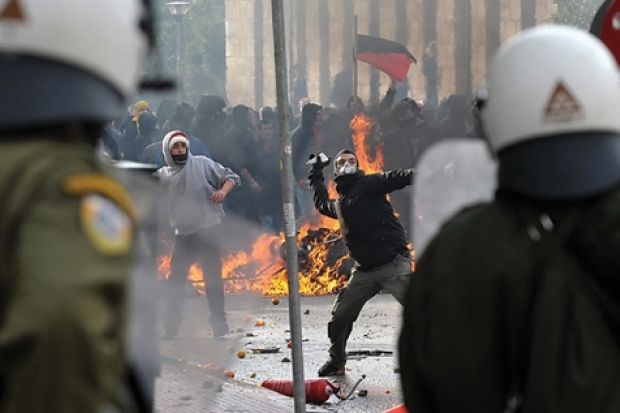Freedom-of-speech laws that banned police from entering Greek universities and led to campuses being labelled "havens for criminals" have been repealed as part of sweeping higher education reforms.
The "academic asylum" rules were introduced to protect freedom of thought and expression on campus in 1982, when memories of Greece's repressive military dictatorships of the late 1960s and early 1970s were still raw.
The rules made it illegal for police to enter university property without the permission of rectors and guaranteed students sanctuary from arrest or state brutality.
But in one of the huge haul of diplomatic cables leaked to WikiLeaks in 2010, Daniel V. Speckhard, the former US ambassador in Athens, said the law was "nothing more than a legal cover for hoodlums to wreak destruction with impunity" and "threatens the academic and student communities".
In December 2009, he wrote: "Campuses have become havens for criminals, most of (whom) are involved in crimes such as drug trafficking, assault, theft, counterfeiting of DVDs and CDs, looting and vandalism."
Professors who spoke out against the rules had been attacked and badly beaten, he added, and their names posted on anarchist websites.
This made rectors unwilling to call the police for fear of reprisals, he claimed. During riots in December 2008, police were refused entry to the University of Athens, where a gang of "Molotov cocktail-throwing vandals" were based, Mr Speckhard wrote.
Permission for police action on campus had been given just three times in nearly 30 years, he added. One occasion was the removal of 620 6ft-high marijuana plants from a field owned by the University of Crete in 2002, the cable said.
The ban was finally scrapped on 24 August this year in an emergency session of the Hellenic Parliament, in which reforms to university governance and course structures were also passed.
Elias Katsikas, associate professor of economics at the University of Macedonia in Thessaloniki, said: "Surprisingly enough, this has not produced a lot of anger on the students' part.
"The description by the American ambassador is fairly close to the reality. After so many violent episodes inside universities, the arguments in favour of the asylum have lost their moral ground."
He added: "Violence inside universities (was) not only expressed in the form of students' assaults against the academic staff, but between groups of students of different political persuasion. I have seen myself many times such regrettable scenes."
Vangelis Tsiligiris, a cross-border education researcher and principal of MBS College, a private higher education institution in Crete, agreed.
"It was a common opinion within Greek society that this was a clearly outdated and abused part of the law," he said. "The idea of the academic asylum remains, but only in the form of free movement of ideas."
The Greek reforms have also introduced UK-style university administration, with vice-chancellors chosen by university governing bodies - as distinct from the previous system of election by students and academics.
Students are also given a maximum amount of time to complete their courses or face expulsion.
Register to continue
Why register?
- Registration is free and only takes a moment
- Once registered, you can read 3 articles a month
- Sign up for our newsletter
Subscribe
Or subscribe for unlimited access to:
- Unlimited access to news, views, insights & reviews
- Digital editions
- Digital access to THE’s university and college rankings analysis
Already registered or a current subscriber? Login
